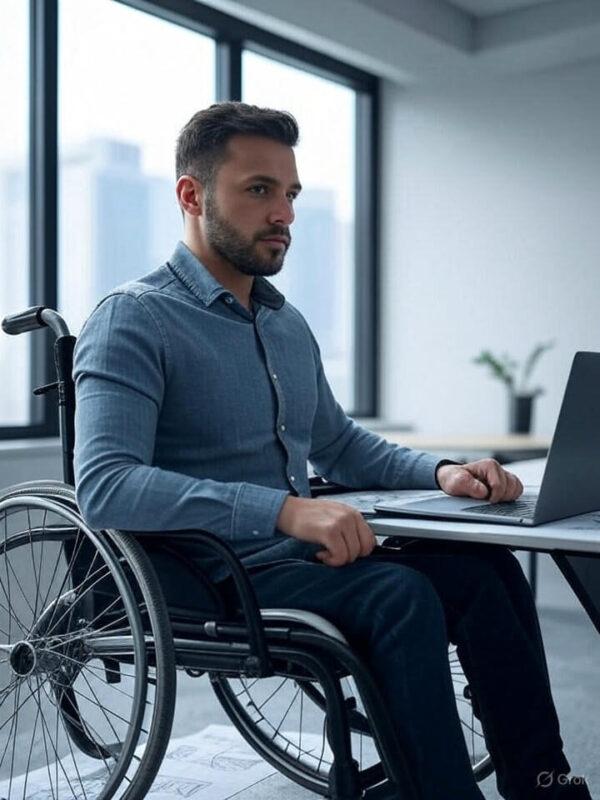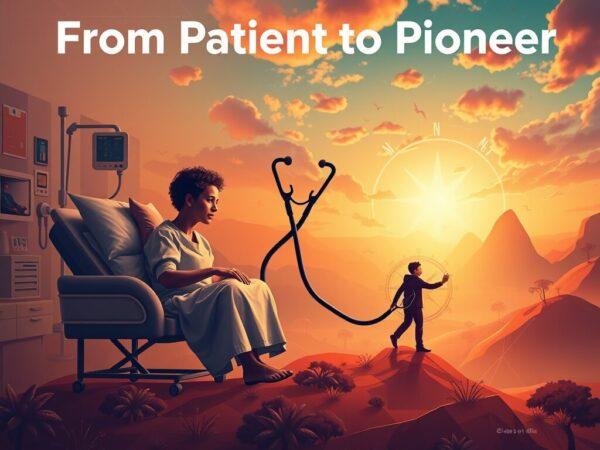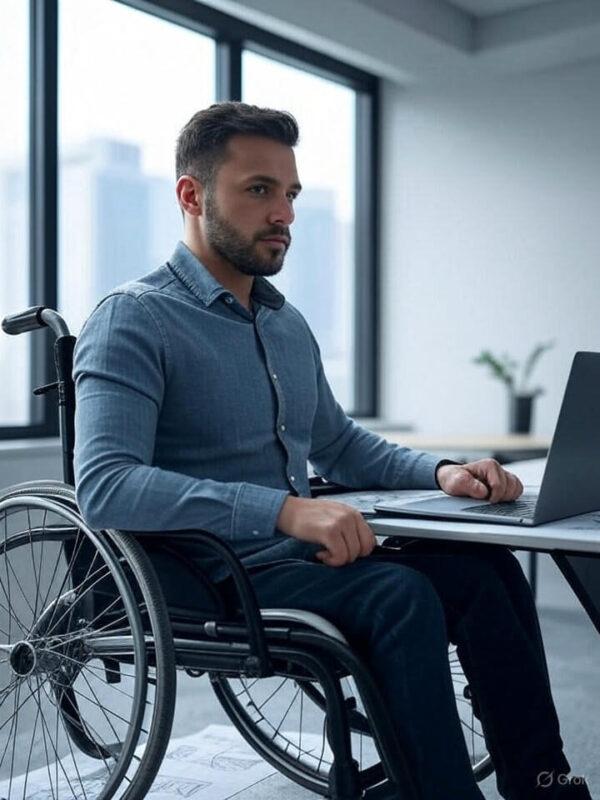
Entrepreneurship with a Disability
In a world that often measures capability through a narrow and conventional lens, a quiet revolution is taking place. At the helm are individuals who have long been masters of adaptation, resilience, and creative problem-solving: entrepreneurs with disabilities. To view disability as a mere obstacle to success is to miss the profound and powerful truth that for many, it is the very crucible in which their entrepreneurial spirit is forged.
I. The Entrepreneurial Mindset: Forged in the Crucible of Challenge
The traditional image of an entrepreneur is often one of a risk-taker, a visionary who sees opportunities where others see none. For an individual with a disability, these traits are not just business skills; they are life skills, honed daily in a world not built for them.
A Paradigm Shift: From Patient to Pioneer

Society frequently casts individuals with disabilities in a passive role—as patients, recipients of care, or subjects of inspiration. It is a deliberate and profound shift in identity from being managed to being the manager, from being a consumer of solutions to being the creator of them. This mental transition is the first and most critical step. The entrepreneur with a disability learns to reject the soft bigotry of low expectations and instead sets their own ambitious goals, driven by a vision that is uniquely their own.
Inherent Resilience and Grit
For a person with a disability, grit is often a prerequisite for daily living. Navigating inaccessible public transport, battling bureaucratic hurdles to get necessary support, or simply enduring chronic pain requires a level of mental and emotional fortitude that is extraordinary. The entrepreneur with a disability is less likely to be deterred by the inevitable setbacks of a startup. The frustration of a failed product launch pales in comparison to the frustration of navigating a world that constantly questions your capabilities.
Empathy as a Superpower
The most successful businesses are those that solve a genuine human problem. This empathy is not a soft skill; it is a market research tool. This “empathy advantage” enables them to design products, services, and experiences that are not just accessible but are universally better designed, more intuitive, and more human-centered.
Creative Problem-Solving as a Daily Reality
When the world is not designed for you, you become an expert in “life hacks.” A person with a disability is constantly required to think outside the box, to find alternative routes, to modify tools, and to devise new ways of accomplishing tasks. This is the very essence of bootstrapping and lean startup methodology.
II. Drives Entrepreneurs with Disabilities

The motivations for entrepreneurship are always personal, but for individuals with disabilities, they are often layered with a unique sense of urgency and purpose. The entrepreneurial path is not just a career choice; it is often a strategic life choice.
The Quest for Autonomy and Flexibility
The traditional 9-to-5 workday, with its rigid schedules, demanding commutes, and often inflexible office environments, can be a significant barrier to employment for people with disabilities. It allows for the creation of a workspace that is perfectly adapted and accessible. This flexibility is not a luxury; it is a necessity that enables them to work at their most productive and creative, without having to constantly fight against a system that was not designed for them.
Financial Independence and Security
The disability employment gap is a harsh reality in nearly every country. It is a way to bypass the gatekeepers of traditional employment—the biased recruiters, the inaccessible workplaces, the managers who see risk instead of potential.
Purpose-Driven Ventures: Solving a Known Problem
Many of the most successful businesses founded by entrepreneurs with disabilities are born from a desire to solve a problem they have personally experienced. These are not businesses created from abstract market analysis; they are born from lived experience.
- Adaptive Clothing Lines: Created by designers with mobility issues who were frustrated with the lack of stylish and functional clothing.
- Accessible Technology Apps: Developed by visually impaired programmers who wanted to create better navigation tools.
- Inclusive Consulting Firms: Started by professionals with disabilities to help companies create genuinely welcoming and accessible workplaces.
This intrinsic motivation to make a tangible difference in the lives of others is a powerful driver that can sustain an entrepreneur through the most challenging periods of their business journey.
A Platform for Advocacy and Representation
For many, entrepreneurship is a form of activism. A successful business led by a person with a disability is a powerful statement.
III. Navigating the Gauntlet: Acknowledging and Overcoming Barriers
To romanticize the journey would be a disservice. Acknowledging these barriers is the first step to dismantling them.
Societal and Attitudinal Barriers
Perhaps the most significant hurdle is the pervasive and often unconscious bias that exists in society. This can manifest in many ways:
- Low Expectations: Potential investors, partners, and even customers may doubt their ability to run a successful business.
- Inspiration Porn: The tendency to be seen as an object of inspiration rather than as a serious business professional.
- Pity and Patronage: Being treated with condescension rather than respect.
It means demanding to be judged on the merit of the business plan, not on the nature of the disability.
Access to Capital: The Funding Gap
Securing startup funding is difficult for any entrepreneur. Venture capitalists and loan officers may harbor conscious or unconscious biases, viewing disability as a risk factor. They may question the entrepreneur’s stamina, their ability to lead a team, or the market potential of a product designed for the disability community.
Strategies to overcome this include:
- Over-preparation: Presenting an impeccably researched and data-driven business plan.
- Building a Strong Network: Leveraging mentors and advocates who can make warm introductions to investors.
- Seeking Alternative Funding: Exploring grants, competitions, and government programs specifically for entrepreneurs with disabilities.
- Highlighting the “Disability Advantage”: Framing their unique perspective as a competitive edge and deep market insight.
Systemic and Logistical Hurdles
The world is still rife with systemic barriers. Inaccessible meeting spaces, websites that are not screen-reader friendly, and complex bureaucratic processes for accessing support services can consume valuable time and energy that could be better spent on the business. Successful entrepreneurs with disabilities become masters of delegation and assertive communication, clearly stating their access needs and insisting on their right to a level playing field.
IV. The Global Stage: International Personalities as Beacons of Inspiration
The power of seeing someone like you succeed cannot be overstated. For an aspiring entrepreneur with a disability, global figures who have achieved greatness not in spite of, but often because of, their unique perspective are powerful beacons of possibility.
Titans of Industry with Invisible Disabilities
- Sir Richard Branson (Dyslexia): The founder of the Virgin Group is perhaps one of the most famous entrepreneurs with dyslexia. Branson has often stated that his dyslexia gave him a different way of thinking.
- Ingvar Kamprad (Dyslexia): The late founder of IKEA struggled with dyslexia his entire life. His difficulty with names and numbers led him to give his products simple, memorable Swedish names.IKEA’s entire business model—simplicity, efficiency, and accessibility for the masses—can be seen as a direct outgrowth of his dyslexic thinking.
Icons of Creativity and Resilience
- Frida Kahlo (Physical Disabilities): While primarily known as an artist, Frida Kahlo was also a masterful entrepreneur of her own image and brand. She did not hide her corsets and braces; she painted them, adorned them, and made them part of her iconic style.
- Sudha Chandran (Amputee): A celebrated Indian actress and classical dancer, Sudha Chandran lost her leg in an accident at the peak of her burgeoning career. Instead, she was fitted with a prosthetic “Jaipur foot” and, through sheer grit and determination, retaught herself to dance.
Voices of a Generation: Modern Influencers and Advocates
- Nick Vujicic (Tetra-amelia syndrome): Born without arms or legs, Nick Vujicic could have lived a life of dependence. He is the CEO of his own life and brand.
- Marlee Matlin (Deafness): An Academy Award-winning actress, Marlee Matlin is a formidable force in Hollywood.
V. Building Your Own Path: Fostering an Ecosystem of Success
While individual grit is essential, no entrepreneur succeeds in a vacuum.
The Crucial Role of Mentorship and Sponsorship
Finding a mentor who understands the unique challenges of entrepreneurship with a disability can be a game-changer. Sponsorship, where a senior leader actively advocates for you and your business, can open doors to funding and partnerships that would otherwise be inaccessible.
Harnessing the Power of Community
The isolation of entrepreneurship can be particularly acute for those with disabilities. Organizations like Disability:IN in the US or the #DisabilityPound in the UK are creating powerful networks and procurement opportunities.
Leveraging Technology and Adaptive Tools
Technology is a powerful equalizer.
Government and Non-Profit Support Systems
These can include:
- Grants and low-interest loans.
- Free or subsidized business coaching and training.
- Procurement programs that give preference to disability-owned businesses.
Conclusion: The Future is Accessible and Entrepreneurial
The rise of the entrepreneur with a disability is more than just an economic trend; it is a cultural shift.
To any person with a disability who harbors an entrepreneurial dream, the message is clear: Your perspective is your power. Embrace your unseen advantage, build your network, and step forward not as a person with a disability who wants to be an entrepreneur, but as an entrepreneur who happens to have a disability, ready to change the world. The future is not just accessible; it is being built by those who know what it truly means to be resilient, resourceful, and revolutionary.
FAQs regarding Entrepreneurship with a Disability:
1. Q: Can someone with a disability truly be a successful entrepreneur?
A: Absolutely! Many individuals with disabilities have built highly successful businesses, leveraging their unique perspectives and problem-solving skills.
2. Q: What are some common challenges disabled entrepreneurs face?
A: Challenges can include access to funding, accessible workspaces, societal misconceptions, and sometimes a lack of specific mentorship.
3. Q: What are some advantages disabled entrepreneurs might have?
A: Often, individuals with disabilities develop incredible resilience, creativity, empathy, and a deep understanding of niche markets related to accessibility or specific needs.
4. Q: Are there specific resources or grants for disabled entrepreneurs?
A: Yes, many governments and non-profit organizations offer grants, loans, and business development programs specifically tailored for entrepreneurs with disabilities.
5. Q: How important is a business plan for disabled entrepreneurs?
A: A well-researched and detailed business plan is crucial for any entrepreneur, including those with disabilities, to secure funding and guide their venture.
6. Q: Should I disclose my disability when seeking investment or clients?
A: The decision to disclose is personal. Focus on your business’s strengths and value proposition. If relevant to your business or if you feel comfortable, you can share.
7. Q: What kind of businesses are well-suited for disabled entrepreneurs?
A: Any business can be suitable! However, some find success in fields like consulting, online services, accessible product development, or businesses that leverage their unique insights.
8. Q: How can I overcome accessibility barriers in my business?
A: Modern technology offers many solutions. Consider remote work, accessible website design, assistive technologies, and seeking advice from accessibility experts.
9. Q: Is mentorship important for disabled entrepreneurs?
A: Yes, mentorship is invaluable. Connecting with experienced entrepreneurs, especially those who understand disability, can provide guidance and support.
10. Q: Where can I find support networks for disabled entrepreneurs?
A: Look for local disability organizations, entrepreneurship centers, online forums, and professional networking groups focused on disability inclusion or entrepreneurship.
·




Really interesting points! Building a solid foundation is key, especially when starting out. I appreciate how platforms like Pinas777 Login focus on gradual skill development – makes the learning curve much smoother! It’s all about that first step.
thx for appreciating. Jazakallah